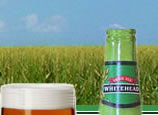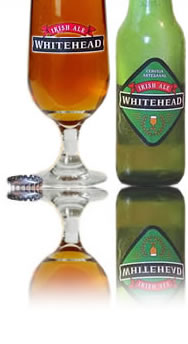 |
 |
 |
|||||
|
|
|
||||||

FAQ
In this section you will find some of most common doubts among our customers. If you don't find here the right answer, please feel free to ask us trought our Contact page.
What's is that sediment found settled in the bottle?
Because our beers aren't filtered and their carbonation is made naturally after bottling, you'll find some yeast deposits in the bottle bottom. The yeast remains live but static, acting as a conservative agent. Don't shake the bottle,otherwise you'll have lots of floating yeast.
I've tasted a Witbier beer ans it was cloud. What has happened?
Absolutely nothig. This beer style is naturally cloud and also know to achive clove anda bananas fuit aromas.
Drinking non pasteurized beer can be dangerous?
Absolutelly not. Because this beer isn't filtered, there's a lot live yeast keping the beer free of patogenic agents. As a matter fact, these beers are excelent for those people suffering of gastro problems and is a rich source of B complex vitamins..
The Whithead expiracy dates are too large but it uses no conservative agensts, how is taht possible?
There's alot of asseptic care during the production process, and it's is added to the live yeast, hops and alchool contents giving to our beer a very extensive lasting.
What I should care when pouring beers wiht yeast settled?
You must cool the beer in the upside position. After, pour it taking care to not mix the yeast with beer, it can easily be done leaving the last half inch of beer in the bottle.
When drinking Witbier, should I mix the yeast?
It's a matter of personal preference. If you like it more cloud and a bigger yeast taste, mix it after to have poured about 3/4 of bottle. Otherwise pour the beer exactly as recommended for the other beer styles. OBS: in any case don't forget to use the special wheat beer glasses.
Why the Whitehead beers don't follow the "law" Reinheitsgebot?
This "law" only permits that barley and wheat malts, hops, yeast and water as the beer ingedients, but we use some spices and noble grains adjuncts (like oat and rye) to achive disctintive texture, color, flavors and aroma. In this way we don't follow the Reinheitsgebot. Our understanding is: the best world beers don't follow this law.
What's an Ale beer?
Ale describes a kind of beer produced by "High Fermentation" process; e.g. a beer fermented at environment temperatures (around 65 F) and using special yeast for this process, which does their their job at the top of fermenter. Normally Ales beers are more aromatic, bodied and tasteful than common Lagers. Among some famous Ale styles we can tell: Pale Ale , ESB, Irish Ale, Porter, Stout, etc..
Is the water something really important in beer quality?
Absolutelly, but this matter was bigger in old times when there was no much knowledge about the differences between good and bad water. Nowadays, using laboratorial analisys, and some water treatment is possible to transform pure water in any kind of water accordingly to each desired beer style. That's what we do at Whitehead, beggining from a triple filtered and declorinated water, absolutely free of unwanted elements, we adjust it's pH and the minerals necessary for each beer tyle produced.
What's the diffference between industrial and handcrafted beer?
Handcrafted beer, like the word says, is produced in small batches, by hand, carefully and with many process criteria, with no interference of automatic equipment, resulting in a unique and exceptional quality products.
How to keep safely the Whitehead beers?
Normally, you must use the same criteria for any kind of handcrafted beer: keep them in upraight position, at a fresh, dry, clean and without direct sunlight. Avoid schoking the bottles. Once cooled, keep in the refrigerator until consumed. Respect the expiracy date printed in the label.
What's malt and yeast?
Malt is a germinated grain, which had it's germinationg process aborted by a dryout process. There are many kinds of malts (wheat, barley, rye, etc..) Yeast is a fungus, a live being, which is created in laboratory, responsible by the transformations of sugars in alcohol and carbonic dioxide. There are so many kinds of yeast, accordingly to each desired beer style, each produces different tastes and aromas.
Why there aren't Whitehead long neck bottles?
Special beers deserve to be apreciated with friends, so this very small bottle don't permit a real good degustation. There's another matter: Witbier glasses are normally about a pint, so a bottle larger than "longnecks" is welcome; and at the last, these beers are delicious what invite us to drink it in a bigger way.
Why do I need to pour the beer with "head"?
The beer head is essential, becaus it keeps the original characterisitics of beer while keeps gasiefication lasting more. As a rule of thumb,one inch is the righ measure.
Pouring my beer I didn't get a good head. What I did wrong?
A headless beer can be caused by: glasses wiht soap or grease residue, in this case rinse the glass with a mix of water and some table sugar, wait a bit and rinse it again with tap water. Beer too cold give you a headless apearence as well, after removing it from fridge wait some minutes to achive the right temperature. Badly poured beer: in this case repeat the pouring operation, iniatially flowing the beer about 10" high over the glass and finsih the job, tilting the glass about 45º to have it full.
Why Whitehead beers don't use twist-off caps?
Twit-off caps are suposed to be used in very common beers. Our beers are intended to be apreciated in special glasses acordingly to each beer style, so we understand that twist-off caps aren't appropriate to our products.
Why I don't find Whitehead beers easily on supermarkets?
Whitehead beers are something special, and it's sold uniquely on fine liquor stores and by e-commerce.
How is possible to Whitehead beer be so crystal clear if it's not filtered?
We use a triple fermantation process, with some special yeasts tha settle almost all the beer sediments, resultin a very cristaline product. The only excepton is the Witbier which is naturally cloud.